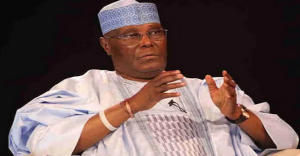 The Nigerian Presidency has expressed its dissatisfaction with former Vice-President Alhaji Atiku Abubakar, accusing him of engaging in “hypocrisy” and providing unsubstantial interventions on the nation’s economy and other pressing matters.
The Nigerian Presidency has expressed its dissatisfaction with former Vice-President Alhaji Atiku Abubakar, accusing him of engaging in “hypocrisy” and providing unsubstantial interventions on the nation’s economy and other pressing matters.
In a statement released on Sunday, February 4, 2024, Mr. Bayo Onanuga, Special Adviser to the President on Information and Strategy, referred to Atiku as the self-appointed “opposition-in-chief” to President Bola Ahmed Tinubu and his administration.
Onanuga emphasized that Atiku’s recent comments concerning the state of the economy and President Tinubu’s efforts were unhelpful and lacked informed analysis. The statement highlighted that Atiku failed to present alternative policy options during his presidential campaign that differed from the economic reform agenda pursued by President Tinubu. It was noted that all major candidates in the last General Elections agreed on the need to end the fuel subsidy regime and address the issue of multiple exchange rates.
The government further accused Atiku of having a vested interest in selling off national assets, including the NNPC Limited, to his associates. In contrast, President Tinubu had taken immediate steps to remove the controversial petrol subsidy upon assuming office on May 29, 2023, and had been actively working towards harmonizing exchange rates to combat illicit activities.
Onanuga clarified that President Tinubu had acknowledged the initial challenges posed by the reforms his administration was implementing but believed they would lead to long-term prosperity. Reputable local and international agencies, excluding Atiku, had commended the administration for its positive, realistic, and sustainable policy trajectory. The Presidency refuted Atiku’s claims about the shrinking private sector and the departure of multinational companies, stating that they lacked factual basis.
Regarding Atiku’s assertions of increased cost of living pressures, the Presidency cited recent comparative cost of living indices that indicated Nigerians enjoyed the lowest cost of living in Africa. The statement urged Atiku, as the leader of the opposition, to provide constructive suggestions rather than using political rhetoric to gain advantage.
Acknowledging the challenges inherited by President Tinubu, the statement highlighted the previous weak economy characterized by fiscal deficits, a low revenue base, high debts, and a disproportionate debt service burden. The government explained that President Tinubu had to make difficult decisions to balance the costs of reforms against the risk of economic recession, ultimately prioritizing the stability and growth of the economy.
The government emphasized President Tinubu’s commitment to addressing the country’s economic and security challenges. It mentioned the positive performance of the Nigerian Stock Exchange, driven by the administration’s fiscal and monetary policies, and emphasized ongoing fiscal and tax policy reforms aimed at promoting rapid recovery and economic growth.
The statement concluded by stating that while President Tinubu and his team are diligently working towards nation-building and progress, Atiku Abubakar and his supporters could continue their criticisms, but they would not impede the administration’s efforts.

